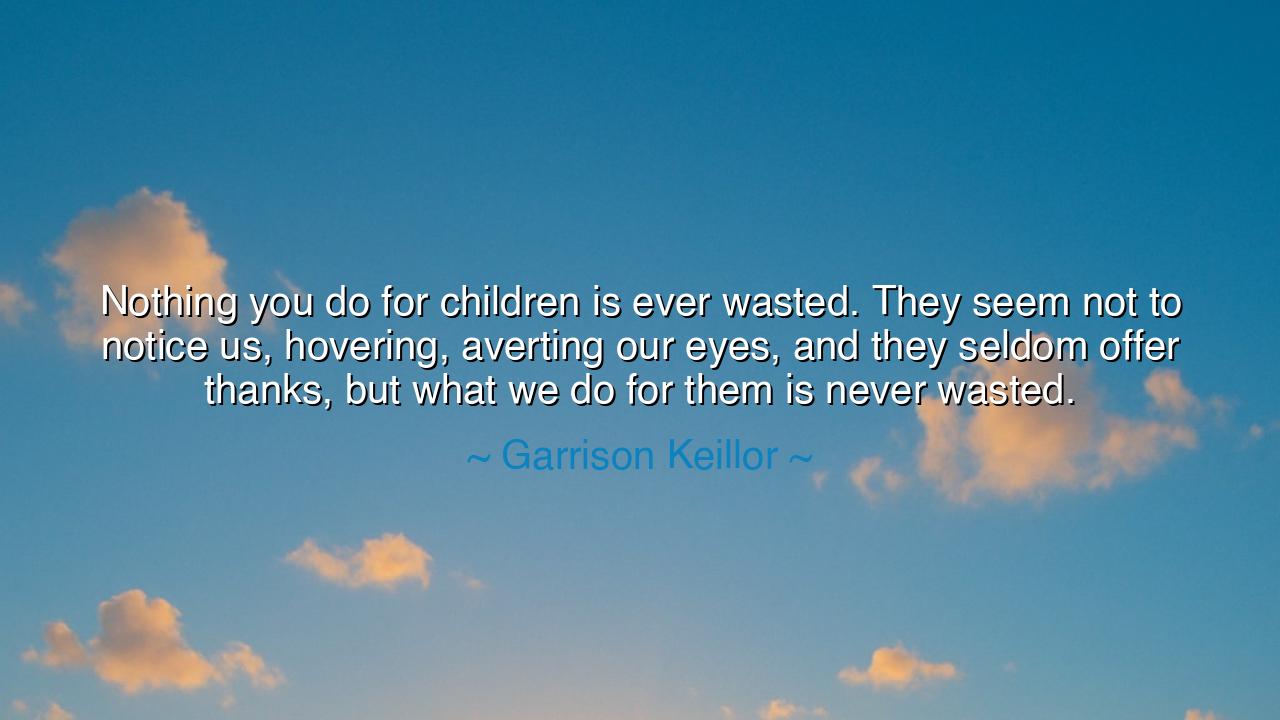
Nothing you do for children is ever wasted. They seem not to
Nothing you do for children is ever wasted. They seem not to notice us, hovering, averting our eyes, and they seldom offer thanks, but what we do for them is never wasted.






Garrison Keillor, in his tender words—“Nothing you do for children is ever wasted. They seem not to notice us, hovering, averting our eyes, and they seldom offer thanks, but what we do for them is never wasted.”—captures the paradox of parenthood and teaching. He speaks of the quiet, often invisible labor of love, where sacrifice is given without expectation of recognition. Children, lost in the immediacy of their own worlds, may not acknowledge the care that surrounds them. Yet the truth remains: every act of guidance, every gesture of nurture, every unseen prayer—none of it is lost. It is planted deep within their being, like seed beneath the soil, waiting for its time to bear fruit.
This wisdom belongs to the ancient rhythm of life. From the dawn of humanity, parents have toiled, often without thanks, to pass on strength, knowledge, and character to their offspring. The harvest of these labors is seldom immediate, and often the children themselves do not realize what they have been given until they are grown. The hand that ties the shoe, the voice that corrects a careless word, the eyes that watch from the shadows—all these build the foundations upon which a child’s life will stand. Keillor’s words remind us that gratitude delayed does not mean the labor is wasted.
History provides us a clear example in the story of Susanna Wesley, the mother of John and Charles Wesley, founders of Methodism. Though her children often seemed indifferent to her strict routines and tireless instruction, her unseen labors shaped two men who would go on to stir revival across nations. She received little thanks while she lived, but her influence endured through centuries. This echoes Keillor’s teaching: that what is done in patience and love, though unnoticed in the moment, is never lost to time.
The truth is also mirrored in the ancient tale of teachers and disciples. Socrates, mocked and often ignored by the youth of Athens, planted seeds of thought in his students that would one day shape Western philosophy. His pupils, like Plato, carried forward the wisdom he imparted, long after his death. What seemed wasted in the eyes of the crowd was, in truth, an eternal gift. So it is with parents and children: what is done in love endures beyond sight.
There is a lesson here for weary mothers, fathers, mentors, and guardians. Do not despair if your work seems unnoticed, if your words are ignored, if your sacrifices pass without thanks. Understand that your acts of love are eternal investments. Just as the farmer does not see the harvest at once, but waits with patience for the rains and the sun to bring forth fruit, so too must you trust that what you pour into the young will, in time, shape their destiny.
The practical action is clear: continue to give, continue to teach, continue to guide, even when no gratitude is spoken. Speak words of encouragement. Provide correction with gentleness. Stand watch in silence when needed. And most importantly, let your heart not be embittered by the absence of thanks. For your reward is not in their immediate acknowledgment, but in the knowledge that you have shaped their lives for the better.
Therefore, the teaching to future generations is this: never measure the worth of your love by the recognition you receive. For nothing done for children is ever wasted. What is invisible today will be remembered tomorrow. What is ignored in the present will become the strength of their future. Plant, water, and tend faithfully, and in time, the garden of your labor will blossom—not only for them, but for the world they will one day touch.
And so the wisdom stands, eternal as the rising sun: every unseen act of love is a stone in the foundation of eternity. Though the child may not see, the universe remembers, and the fruit of your care will endure beyond your years. This is the sacred truth of parenthood, of teaching, and of love itself.






AAdministratorAdministrator
Welcome, honored guests. Please leave a comment, we will respond soon